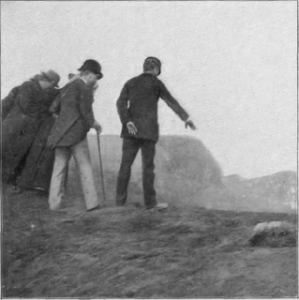 Yesterday’s exploration of ‘What would George say?’ led me to following up a few points of research and whilst browsing around I came across this quote of Orwell’s:
Yesterday’s exploration of ‘What would George say?’ led me to following up a few points of research and whilst browsing around I came across this quote of Orwell’s:
Here is a saying of Nietzche which I have quoted before, but which is worth quoting again:
He who fights too long against dragons becomes a dragon himself;
and if you gaze too long into the abyss, the abyss will gaze into you.
’Too long’, in this context, should perhaps be taken as meaning ‘after the dragon is beaten’.
The line that struck a chord with me here, and has done for some years now, is ‘the abyss will gaze in to you’. My topic for today – have we all spent rather too long staring in to the abyss and what have we bought back with us from there?
I guess a good place to start is with exactly what I mean by ‘the abyss’. For me it’s that spiritual dark place where your personal and our cultural demons lie. The trick is that whilst we need to be aware of the fact it’s there, we shouldn’t get ourselves too engrossed in it’s finer geography. I look at it in the way that CS Lewis spoke of the Devil in ‘The Screwtape Letters’:
‘There are two equal and opposite errors into which our race can fall about the devils. One is to disbelieve in their existence. The other is to believe, and to feel an excessive and unhealthy interest in them. They themselves are equally pleased by both errors.’
Over the years I’ve wandered to the edge of my personal abyss a few times and stepped back. We all have our personal demons – what matters is whether we give them the freedom to do anything. Show me somone who claims to have no personal demons and I’ll show you a liar. And then there are those people whose demons are, shall we say, rather more unpleasant than those that most of us have; the criminal, the depraved, the insane. The problem that we have today, I believe, is twofold – the abyss is now much wider and deeper than it was even 20 years ago, and it impinges more than ever in to our daily lives.
In 1984, Frankie Goes to Hollywood asked the question “Are we living in a land where sex and horror are the new gods?’ Back then I think the answer was still ‘yes’, but we didn’t really know what was around the corner. Twenty-five years down the line the abyss comes in to our house courtesy of the Internet. Without sounding too much like Mary Whitehouse on a Sunday Evening, the Internet, cinema and TV have increasingly bought the baser instincts of human beings to the forefront of our consideration. I’m not dumb enough to believe that, in the words of Philip Larkin ‘Sexual intercourse began in 1963 (which was rather late for me)‘. Interest in the more extreme edges of pornography – whether that pornography is the pornography of sex or that of violence – has always been with us and was usually squirrelled away in the far recesses of most people’s minds for a number of reasons:
Society was more ‘up tight’ – certain forms of behaviour or artistic expression were simply regarded as wrong and tended to be either illegalor seriously frowned upon by society. Sometimes this was right (IMO) and othertimes it was ridiculous. But there were boundaries set.
- There seemed to be less moral relativism – there seemed to be much more of a concensus view in society as to what was ‘right’ and ‘wrong’.
- Extremely violent pornography of graphical violence was difficult to get hold of.
- Anyone who DID have extreme interests was typically on their own; they were in no position to talk about it with friends who might be horrified at their interest.
In these circusmtances, if you went to your abyss, and peered in, and did dwell there a while the risk was pretty minimal for society as a whole. Your trip was a private one, one not to be shared with anyone. And for most of us there was the knowldge that certain things were, to put it bluntly, totally wrong.
The Internet has brought a lot of good in to people’s lives, but it has also amplified the potential for people to gaze deeper and for longer in to the abyss. It’s had two main impacts:
- Extreme sexual and violent imagery is available to everyone more easily than ever before in history.
- The sheer scope of the Internet means that it’s inevitable that no matter how extreme a person’s ‘interests’ are, it’s almost inevitable that somewhere in the 1.7 billion Internet users there is someone else with the same interests, and a web site delivering up media to accomodate those interests.
The impact of these two facts is that people with particularly unpleasant demons in their abyss now find, to their mind, their beliefs and views validated by the existence of those websites and users. This permits these individuals to look in to their personal abyss and see nothing wrong with what they see there, and hence feel encouragement to express their views in to the world. It’s not trendy to be in favour of censorship, but the validation of perversity that seems to be increasingly common surely cannot be healthy for society as a whole.
The phrase ‘People of the Abyss’ was used by Jack London as the title of a book he wrote in the early 1900s about the poverty of the East End of London; I believe wholeheartedly that we’re now generating a new breed of people of the abyss – those who’ve started hard and long in to the depths of their abyss, and have bought back their personal demons with them in to the workaday-world. This new breed of Abyss Dwellers are to be feared and shunned; their moral compass seems to be dictated by ‘it works for me and is no one else’s business what I do’ and they exhibit a lack of respect for the social codes of the society in which they live.
It’s not just extreme sex and violence that is an issue; I’ve just spent some time watching scenes of anti-fascist demonstrators protesting outside the BBC about the appearance of Nick Griffin of the BNP on BBC’s Question Time. There is soemthing ironic about a group allegedly demonstrating to preserve democracy by attempting to censor a TV programme. Perhaps these anti-fascists who’ve ‘fought the dragon’ are in danger of becoming that which they fight? In George Steiner’s novella ‘The Portage to San Cristobal of A.H.’ – written in 1981 – a trial in teh South American jungle allows the 90 year old Hitler, who in this novella survived the fall of Berlin, to explain himself. One comment made is that those who fought agaisnt him have taken on board many of the characteristics of his regime – in other words, by peering in to teh Nazi abyss and fighting the dragon, they’ve fought for too long and brought parts of the abyss back with them, and have now become the dragon which they once fought. Defending democracy is a delicate balancing act; you should not get so involved in the way of the enemy that you forget that you fight against that you forget the positive characteristics of what you’re fighting for.
In his novella, Steiner has a character say:
“There shall come a man who […] will know the grammar of hell and teach it to others. He will know the sounds of madness and loathing and make them seem music.”
He was, obviously, referring to Hitler in the book but today there are many such people in the public eye and those who we personally may be aware of who might be described in the same way. Modern people of the abyss who’ve been there and returned with a little more than they bargained for, and who’re determined to further expand their view of the world, and widen the abyss further, expanding the geography of Hell further in to our daily lives.
I’m a Christian – I think that colours my opinions on a number of topics, and makes me address them from a particular moral and ethical standpoint. Whether you have an religious beliefs or not I’d simply suggest that you at least become aware of the place of the abyss in your own life; what you choose to do with it when you find it’s location is up to you. Just remember that having gazed a little too long and deep, you may find that even if you leave the abyss, it may not entirely leave you.
 I came up with the title for this piece after reading this article on the BBC Website about people who the authors of a paper called ‘online exhibitionists. The idea is that much privacy legislation is based around the idea of what levels of privacy someone can reasonably expect to have when out and about in public. So, if we live in a world where people are relatively circumspect, photography and publication in public places is rare, then we can expect to have some right to privacy based on a reasonable expectation that you won’t be photographed. If you’re a celebrity, then your expectation can be less because you might reasonably expect to have people taking pictures and hassling you because the nature of your work has put you in the public eye. Right or wrong, that’s the way it’s tended to run over recent years.
I came up with the title for this piece after reading this article on the BBC Website about people who the authors of a paper called ‘online exhibitionists. The idea is that much privacy legislation is based around the idea of what levels of privacy someone can reasonably expect to have when out and about in public. So, if we live in a world where people are relatively circumspect, photography and publication in public places is rare, then we can expect to have some right to privacy based on a reasonable expectation that you won’t be photographed. If you’re a celebrity, then your expectation can be less because you might reasonably expect to have people taking pictures and hassling you because the nature of your work has put you in the public eye. Right or wrong, that’s the way it’s tended to run over recent years.
 Yesterday’s exploration of ‘What would George say?’ led me to following up a few points of research and whilst browsing around I came across this quote of Orwell’s:
Yesterday’s exploration of ‘What would George say?’ led me to following up a few points of research and whilst browsing around I came across this quote of Orwell’s: No, finding that book set off a set of thoughts and conversations with my wife that resulted in me looking at the Britain that we’ve ended up with in 2009 – and I guess by extension the rest of the world – and wondering ‘What would George say?’
No, finding that book set off a set of thoughts and conversations with my wife that resulted in me looking at the Britain that we’ve ended up with in 2009 – and I guess by extension the rest of the world – and wondering ‘What would George say?’